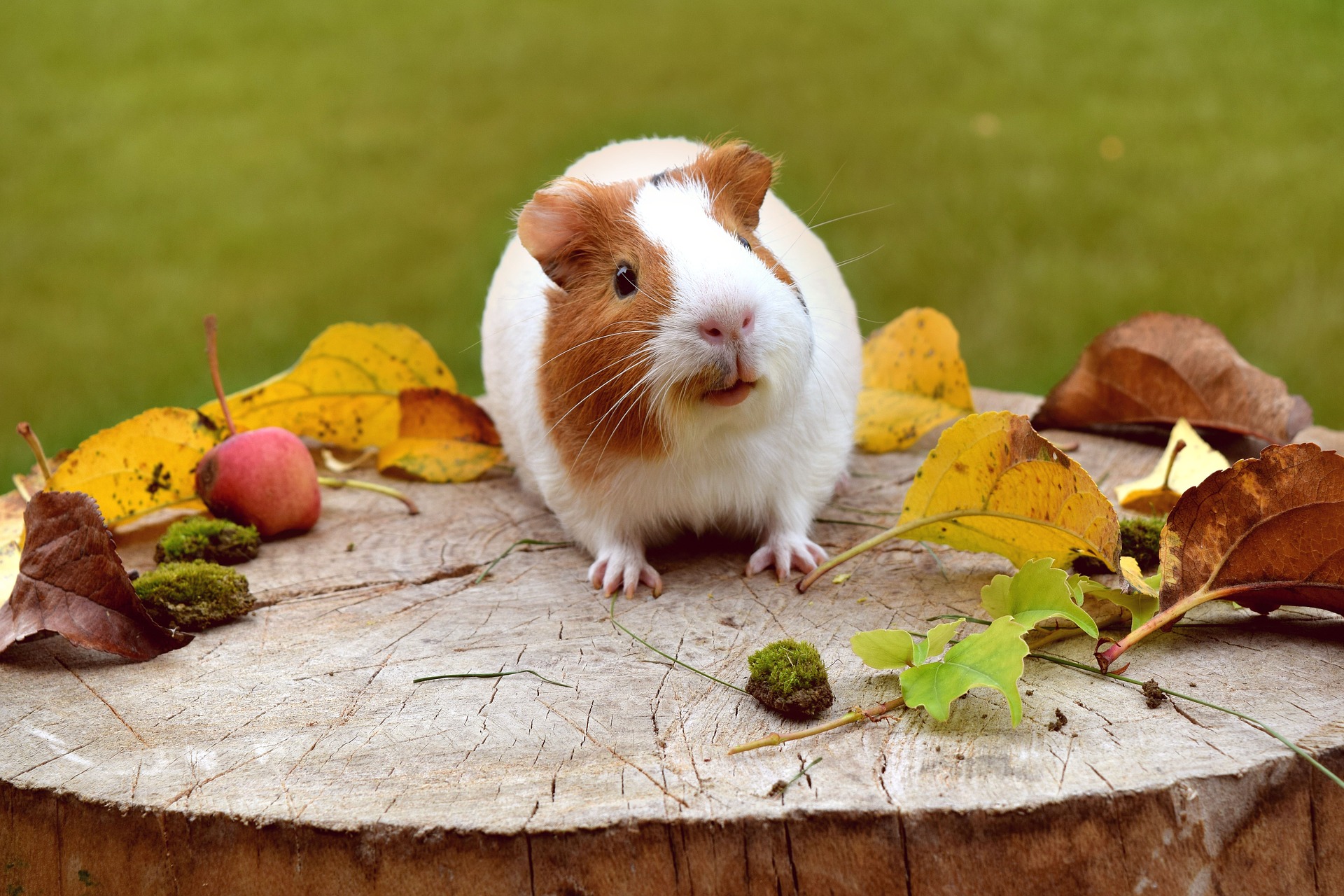Guinea pigs are insanely cute pets. They look cute, they act cute, and they make cute noises too. But maybe not every sound they make is cute. What about burps, for example? Can guinea pigs burp?
Guinea pigs can indeed burp. Most animals have the ability to burp, including guinea pigs. There can be several reasons for burps, some are natural, others indicate health problems. Usually it is simply because they swallowed air while eating or drinking.
So guinea pigs actually have the ability to burp. Of course, they don’t burp the way a human does after five beers at Oktoberfest, but they do it in their own way.
Read on to learn more about why guinea pigs burp, how a burp occurs in the first place, and what health reasons can lead to burping. We then also clarify the question of whether guinea pigs can vomit or not.
Why Do Guinea Pigs Burp?
There are many different reasons why a guinea pig might burp. Most of the reasons are absolutely harmless. However, it can also indicate a health problem when a guinea pig burps.
In many cases, however, the sounds a guinea pig makes are not burps at all. They just sound very similar and can therefore be mistaken for burps.
Swallowed Air
One of the reasons why guinea pigs burp is simply that they have swallowed air. This happens to all of us, and it is not uncommon in the animal world either.
When you eat or drink something, there is always air in the mass that you send down your esophagus. Of course, this air also wants to come out at some point, and then a burp creeps out of the little guinea pig.
Digestion Process
Gases are produced during the digestion of food. These gases are mainly produced in the intestines and make a different kind of body sound.
However, some gas will also develop in the stomach during digestion. This gas, just like the swallowed air, wants to get out of the stomach. And the easiest way for the gas to get out of the stomach is to burp.
Choking
Guinea pigs may try to swallow something that is too big for them. The result is that they try to choke it out again.
The gagging sounds that guinea pigs make sound a lot like burps. So it may be that your guinea pig is trying to get rid of something that won’t fit through the esophagus.
Choking can be quite dangerous for your guinea pig. There are cases when guinea pigs have choked on too large pieces of food.
The best way to avoid this is to give your guinea pig only small pieces of food.
Remember how small they are. Accordingly, their esophagus is not that big either. So cut larger pieces into small enough pieces beforehand so that your guinea pigs are not in danger of choking.
Hiccups
Guinea pigs can also have hiccups. This is usually quite natural and nothing to worry about.
Guinea pigs hiccup when they are excited, such as when playing or when they realize they are getting a meal.
Hiccups can of course also be caused by negative influences, when guinea pigs are frustrated or angry. However, it is usually positive triggers that cause hiccups.
The sounds a guinea pig makes when it hiccups also sound similar to burps. So it could simply be a hiccup.
Growling
Guinea pigs can actually growl. It doesn’t happen very often, but it can happen occasionally. Most of the time they growl out of fear.
When a guinea pig is anxious because it feels cornered, it may start growling.
Occasionally, growling is accompanied by teeth grinding. The guinea pig is then very stressed. You should leave it alone until it calms down. It may also attack you and scratch or bite if you try to pick it up.
Purring
Guinea pigs can purr like cats. However, they express much more through purring than cats do. They signal how they feel by the pitch of their tone.
A deep purr signals that your guinea pig is happy. Especially if it looks happy, too. A high-pitched purr, however, signals that your guinea pig is bothered.
A short, choppy purr signals that your guinea pig is anxious. Guinea pigs are alert to danger and may respond in this way if they hear or see something alarming. They also warn nearby conspecifics in this way.
If your guinea pig is particularly comfortable with you, it may even purr at you.
Upper Respitory Infection
A less pleasant reason for burping in guinea pigs is that they may have an infection. With an upper respitory infection, guinea pigs can make noises that sound like burps.
Even though guinea pigs are good at hiding when they are sick, this should not be taken lightly. This infection should be investigated by a veterinarian. The vet will probably prescribe antibiotics to cure the infection.
Besides burping, there are several other symptoms that may indicate an upper respitory infection:
- They have crusty eyes
- They have a snotty nose
- The coat is in poor condition
- They refuse to eat or drink
- They have problems breathing
If there are other signs of infection besides burping, you should really see the vet.
What Is a Burp?
Burping is the noisy regurgitation of air from the upper digestive tract through the mouth. Burps mainly occur in the esophagus and stomach. The various onomatopoeic names are based on the typical sounds.
Burping is often caused by drinking or eating too quickly, often swallowing air along with it. People can also provoke burps by intentionally swallowing air.
In people, burping also occurs when drinking carbonated beverages such as mineral water, beer, sparkling wine, or lemonade. Burping can also occur after taking food soda, for example, as a remedy for heartburn. In these cases, the gas belched up is carbon dioxide.
Occasional burping in humans does not usually require therapy. However, excessive or persistent belching may occur as an accompanying symptom of aerophagia, gastroesophageal reflux, or gastritis, among others.
Can Guinea Pigs Throw Up?
Guinea pigs can not throw up. This may be a rather surprising answer, but they have this in common with all other rodents.
There are several reasons for this. Simply put, their physiology and neurology are to blame.
On the physiological side, these are the reduced muscles of the diaphragm and a stomach that is not designed to move its contents up their throats.
On the neurological side, they apparently lack the brain circuitry normally responsible for vomiting.
Researchers at the University of Pittsburgh Cancer Institute gave rodents substances that normally cause vomiting. However, they found that the rodents then showed less nerve, mouth, throat and shoulder activity than other animals would.
So vomiting just doesn’t seem to be a behavior that rodents have developed over evolutionary time. Presumably, they simply did not need it in their way of life.
What Reasons Do Other Animals Have to Burp?
There are animals that have other reasons for burping due to their physiology. Or at least for something that sounds or looks like burping. Let’s look at some examples of unusual burping animals.
Fish
Some fish, such as Carangidae, emit gas from under their gill covers. I imagine it is very funny when a fish underwater emits something like a burp.
However, the burp is not actually a classic burp in that case. It simply comes from the gas from the swim bladder.
Fish are physiologically completely different from humans or mammals in general. Their physiology would not allow them to emit a human-like burp. Nevertheless, it remains a funny idea.
Ruminants
Ruminants are a suborder of even-toed ungulates. They are herbivores and have a multi-part ruminant stomach.
This enables them, through microbial digestion, to use as food even those carbohydrates that are indigestible for other mammals with only one stomach.
Ruminants include cattle, sheep, goats, antelopes, giraffes, deer, and other animals.
Fermentation gases are produced during microbial digestion in the rumen of ruminants. The release of these gases is called ructus, ructation, or eflation.
The sound it makes is like a burp. And it also smells like a rather unpleasant burp. It’s easy to find out for yourself, because cows burp quite a bit. But be careful, it can be dangerous to approach a cow. Especially if she is pregnant or has recently calved.
A fun fact is that in medical terminology, burping in humans is also called ructus.


